In the complex world of contracts, every signature holds weight. But who exactly are the people behind those signatures, and what does it mean to be a contract signatory?
Understanding this concept is crucial for anyone entering into a legal agreement. This blog post dives deep into the world of contract signatories, explaining their role, responsibilities, and the nuances associated with authorized signatories.
Contract Signatory: Meaning and Function
A contract signatory is any individual or entity (like a company) who signs a contract, signifying their understanding and acceptance of the terms and conditions outlined within the document. Their signature acts as a binding commitment, making them legally responsible for upholding their end of the bargain.
Contracts can have multiple contract signatories, each representing a distinct party to the agreement. For instance, a sales contract might involve a buyer and a seller, both of whom would be considered signatories. International treaties, on the other hand, can have numerous signatory countries.
The importance of a contract signatory cannot be overstated. Their signature serves as concrete proof of their consent and establishes a legally enforceable obligation to fulfill the contract’s terms.
Key Responsibilities of a Contract Signatory
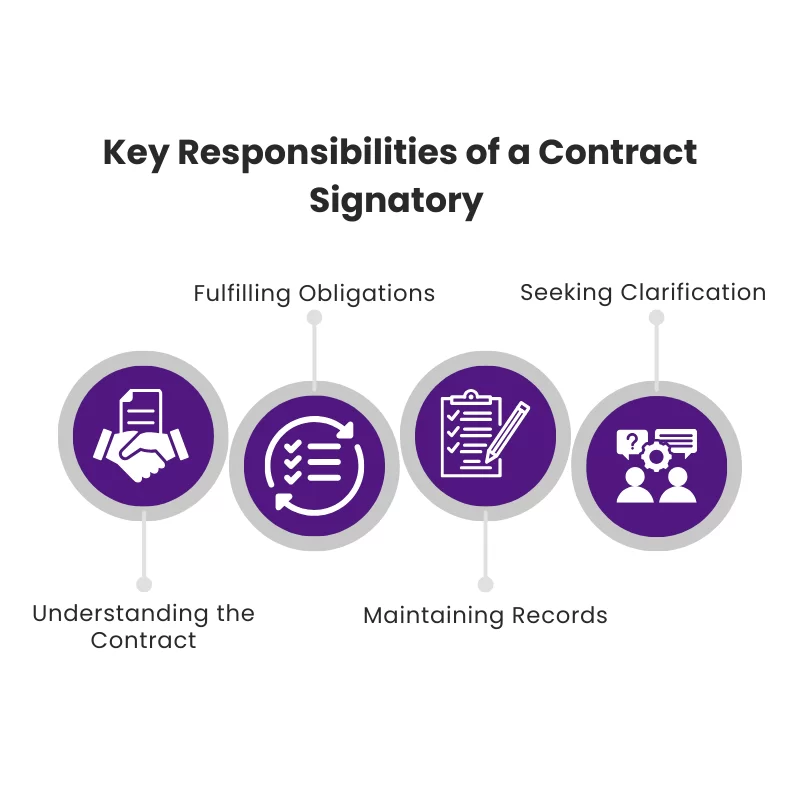
Being a contract signatory comes with a set of significant responsibilities:
- Understanding the Contract: Signatories have a legal duty to thoroughly comprehend the contract’s content before signing. This includes carefully reviewing all clauses, understanding the obligations they are undertaking, and identifying potential risks. Rushing into signing without proper understanding can lead to legal complications down the line.
- Fulfilling Obligations: Once a contract is signed, the signatory becomes bound to fulfill their stipulated obligations. This could involve delivering goods or services, making payments, or adhering to specific conduct outlined in the agreement. Failure to meet these obligations may result in legal consequences, including breach of contract lawsuits and contract disputes.
- Maintaining Records: Contract signatories are often responsible for maintaining copies of the signed agreement for future reference. This ensures they have a clear record of their commitments and can easily retrieve the contract if any disputes arise.
- Seeking Clarification: If any aspect of the contract is unclear or ambiguous, signatories have the right to seek clarification before signing. Legal counsel can be invaluable in such situations, as they can help interpret the contract’s terms and ensure both parties are on the same page.
Authorized Signatory: Meaning and Role
In many cases, companies or organizations designate specific individuals as authorized signatories. These individuals hold the legal authority to sign contracts on behalf of the entity they represent. This delegation of power streamlines the contracting process and ensures authorized personnel handle legally binding agreements.
An authorized signatory, in essence, is someone with the legal power to bind the organization they represent to a contract through their signature. This authority comes from a formal internal approval process within the company.
Authorized signatories typically go through a formal internal approval process to obtain their signing authority. Companies often establish clear guidelines outlining who can be an authorized signatory and the types of contracts they are empowered to sign.
It’s crucial to distinguish between a contract signatory and an authorized signatory. While any party to a contract is a signatory, only designated individuals within a company or organization hold authorized signatory status.
The Importance of Due Diligence for Contract Signatories
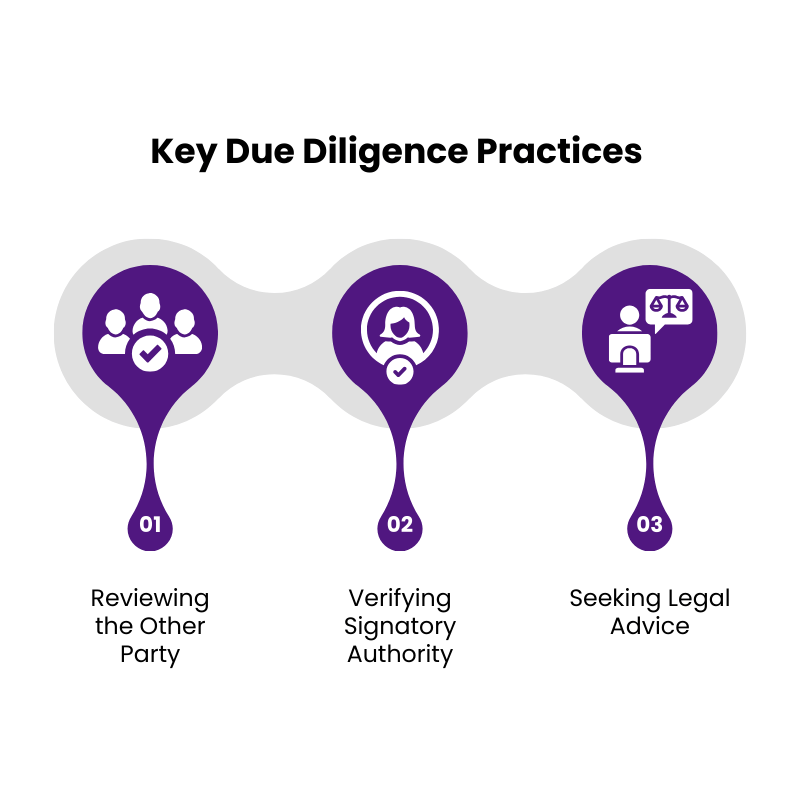
Before signing any contract, it’s essential for contract signatories to exercise due diligence. This involves taking proactive steps to minimize risk and ensure a smooth contractual relationship. Here are some key due diligence practices:
- Reviewing the Other Party: Research the counterparty involved in the agreement. Verify their legitimacy and assess their financial stability.
- Verifying Signatory Authority: In the case of dealing with companies, confirm that the individual signing the contract is a designated authorized signatory.
- Seeking Legal Advice: For complex contracts, consulting with a lawyer is highly recommended. Legal counsel can identify potential issues, negotiate favorable terms, and ensure the contract aligns with your interests.
Electronic Signatures and the Modern Contract Landscape
The traditional method of signing contracts on paper is increasingly giving way to electronic signatures. E-signatures offer a convenient and secure way to finalize agreements, making the process faster and more efficient.
Many legal systems around the world recognize e-signatures as valid and enforceable, provided they meet specific criteria.
However, contract signatories using e-signatures should still ensure they understand the technology and its limitations. They should also verify the legitimacy of the e-signature platform being used.
Different Types of Contract Signatories
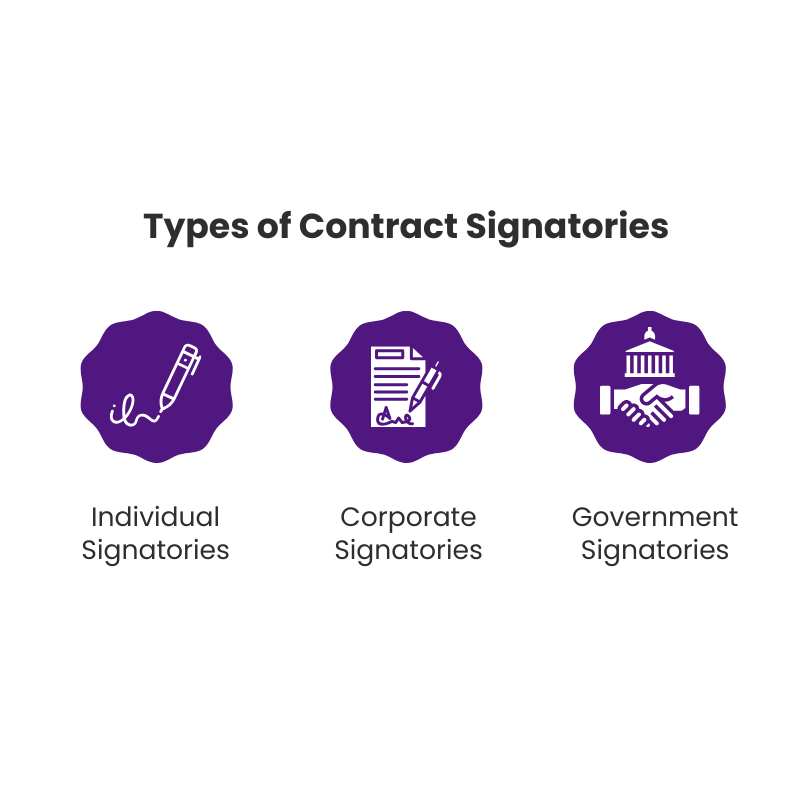
Beyond the basic definition, it’s important to understand that there can be different nuances associated with contract signatories. Here are some specific types you might encounter:
- Individual Signatories: In its most straightforward form, a contract signatory can be an individual entering into an agreement for themselves. This is common in employment contracts, service agreements, or independent contractor agreements.
- Corporate Signatories: When companies are involved, designated authorized signatories act on behalf of the business entity. These individuals typically hold specific titles within the organization and have the legal authority to bind the company to the contract’s terms.
- Government Signatories: Government representatives acting on behalf of a state or nation can be signatories to international treaties or agreements between countries.
Understanding the type of signatory involved can provide context for their role and the level of authority they hold within the agreement.
Best Practices for Contract Signatories
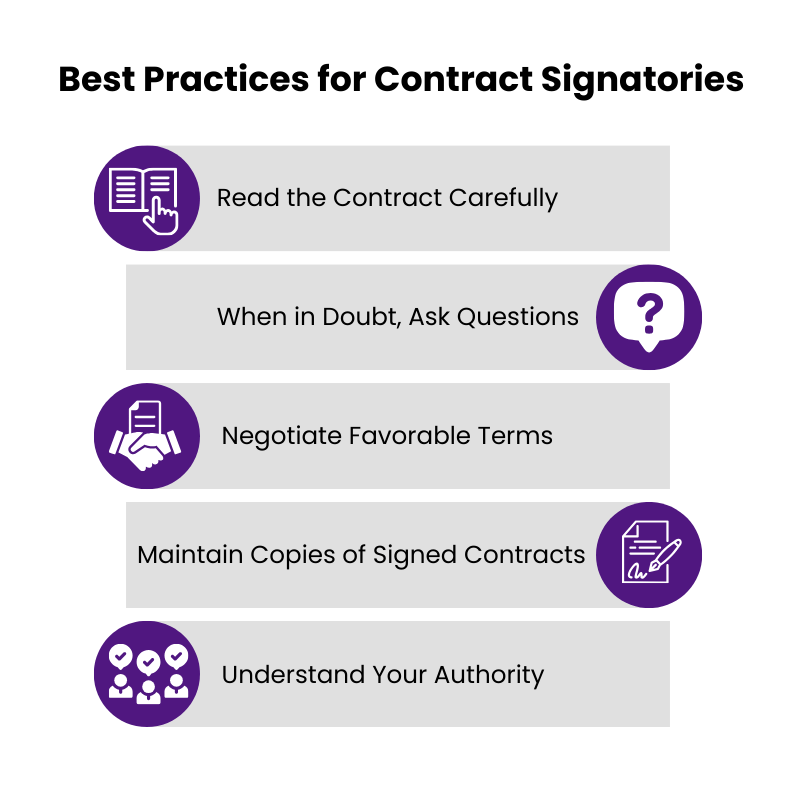
Equipping yourself with best practices can make you a more informed and responsible contract signatory. Here are some key tips to follow:
- Read the Contract Carefully: This may seem obvious, but thoroughly reviewing the entire contract before signing is crucial. Pay close attention to key terms, obligations, and potential risks.
- When in Doubt, Ask Questions: If anything in the contract is unclear, don’t hesitate to seek clarification from the other party or consult with a lawyer. Understanding the terms is essential before signing.
- Negotiate Favorable Terms: Depending on your situation, there may be room for negotiation on certain aspects of the contract. Don’t be afraid to advocate for your interests and seek terms that are beneficial to you.
- Maintain Copies of Signed Contracts: Always keep a copy of the signed contract for your records. This will be helpful for future reference and in case any disputes arise.
- Understand Your Authority: If you’re signing on behalf of a company, ensure you have the designated authority to do so. Verify your organization’s internal procedures for authorized signatories.
Common Mistakes to Avoid
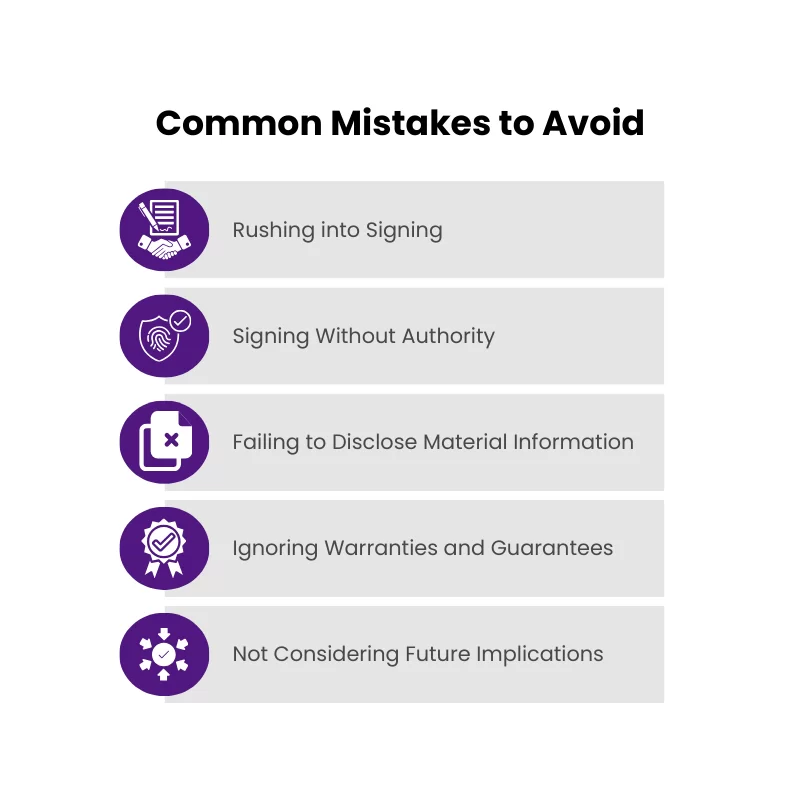
Being aware of common pitfalls can help you navigate the contract signing process more effectively. Here are some mistakes to avoid:
- Rushing into Signing: Don’t feel pressured to sign a contract immediately. Take your time to read, understand, and potentially negotiate the terms before finalizing the agreement.
- Signing Without Authority: Never sign a contract on behalf of someone or something you don’t have the legal authority to represent. Ensure you have the proper designation as an authorized signatory if signing for a company.
- Failing to Disclose Material Information: If you’re aware of any information that could be relevant to the other party’s decision-making, disclose it before signing. Withholding such information could be considered fraudulent misrepresentation.
- Ignoring Warranties and Guarantees: Carefully review any warranties or guarantees offered within the contract. Understand what protections they provide and the limitations associated with them.
- Not Considering Future Implications: Think about the long-term implications of the contract. Will it have lasting impacts on your business or finances? Consider potential future scenarios before signing.
Understanding the Role of a Contract Signatory
Being a contract signatory is a responsibility that shouldn’t be taken lightly.
By understanding the role, obligations, and due diligence practices associated with signing contracts, individuals and entities can navigate the contractual landscape with greater confidence.
Remember, a well-drafted and understood contract protects all parties involved, fostering a successful and transparent business relationship.




